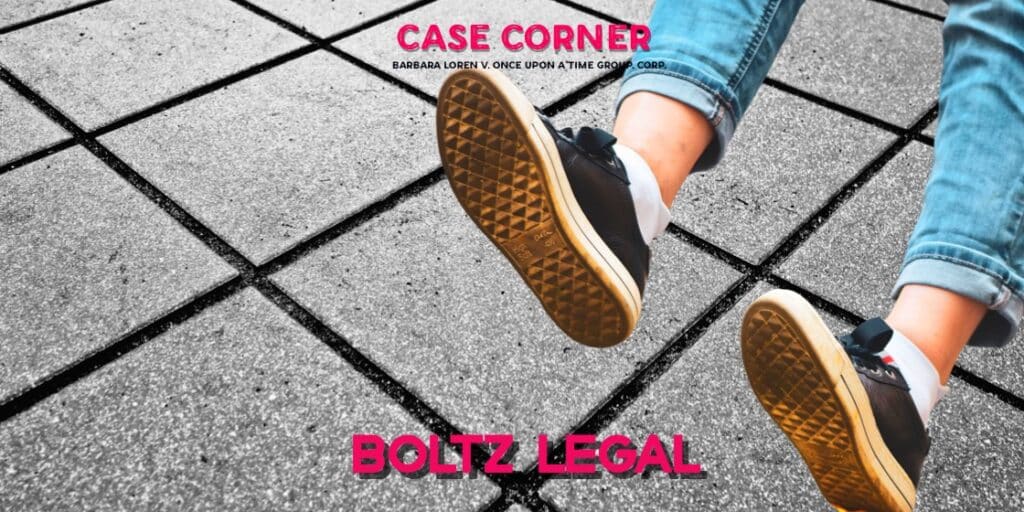Jurisdiction: Fourth District Court of Appeal, Florida
Case No.: 4D2023-3154
Lower Tribunal Case No.: 502019CA011719
Date: July 9, 2025
Lower Court: Circuit Court for the Fifteenth Judicial Circuit, Palm Beach County; Judge Gregory M. Keyser
Slip-and-Fall Case at Restaurant Returns to Trial After Errors in Verdict and Closing Arguments
In this slip-and-fall case, plaintiff Barbara Loren sued Once Upon a Time Group, the owner of a restaurant in Palm Beach County, after she slipped and fell on what she described as dirty, greasy water on the floor near the patio entrance. A jury found the restaurant negligent and awarded Loren $437,186, including over $400,000 for pain and suffering. However, post-trial, the court granted the defendant’s motion for directed verdict and alternatively a motion for a new trial based on improper closing arguments by Loren’s attorney. On appeal, the Fourth District Court of Appeal reversed the directed verdict but affirmed the order for a new trial.
Background
Loren’s fall occurred inside the restaurant, near a patio entrance, on a day when it was not raining. She testified that the floor was “wet, greasy, and dirty” and noted a black stain on her pants after the fall. Emergency responders who came to assist her also slipped in the area, underscoring the hazardous condition.
The restaurant denied liability, but the jury sided with Loren, assigning no negligence to her and awarding substantial damages. The restaurant then moved for a directed verdict, arguing Loren failed to prove it had notice of the condition. Alternatively, it moved for a new trial due to alleged misconduct during closing arguments.
Constructive Notice: Enough Evidence to Go to Jury
Under Florida law, a plaintiff must prove that a business had actual or constructive knowledge of a dangerous condition to prevail in a slip-and-fall case involving a transitory substance. Here, Loren did not allege actual knowledge but argued the restaurant had constructive notice. She presented the following evidence:
- Condition of the Water: Loren described the water as “greasy, dirty,” and noted the floor was slick and discolored. Water normally being clear, the dirty appearance allowed the jury to infer it had been present long enough for employees to have seen and cleaned it.
- Foot Traffic: The bar manager acknowledged that many patrons passed through the area in the 10–15 minutes before the fall, supporting the idea that staff had ample opportunity to notice the spill.
- Recurring Hazard: Evidence showed that condensation regularly formed near the restaurant’s exterior doors, particularly in the summer. The plaintiff’s expert, during an unannounced August inspection, found droplets forming on diffusers and tracked condensation throughout the restaurant.
- Restaurant Awareness: Both the bar manager and owner admitted that mats were often placed in this area for safety due to condensation. The jury could reasonably infer that this specific spot was a known problem area — and the mat was missing at the time of the incident.
This cumulative evidence satisfied both prongs of constructive notice under § 768.0755: (1) the condition existed long enough for the restaurant to discover it, and (2) the condition occurred with regularity and was therefore foreseeable. Accordingly, the appellate court ruled that the directed verdict was improper, and the jury was entitled to weigh the evidence.
New Trial Justified: Improper Closing Argument
While Loren succeeded on the evidentiary issue, the court affirmed the order for a new trial due to multiple prejudicial missteps by her attorney in closing arguments. The trial court identified three separate issues:
- Reading from an Excluded Deposition: Loren’s counsel read a portion of the bar manager’s deposition that had been explicitly excluded from evidence by agreement of the parties.
- Misrepresenting Testimony: The attorney stated that a doctor had testified that knee replacement surgery would cost over $100,000 — despite no such testimony and a withdrawal of the future medical expense claim.
- Suggesting Spoliation of Evidence: Counsel implied that the restaurant had destroyed or withheld surveillance footage, though there was no such evidence admitted.
Each of these statements drew objections and motions for mistrial. The trial court found that the cumulative effect of the improper statements denied the defendant a fair trial and warranted a new one. On appeal, the Fourth DCA affirmed, citing the trial court’s broad discretion to ensure a fair process.
Conclusion
This case highlights the importance of both evidentiary sufficiency and trial conduct. While Loren presented enough evidence to submit the case to the jury on the issue of constructive notice, her attorney’s improper statements in closing arguments tainted the jury’s verdict. As a result, the appellate court reversed the directed verdict but upheld the order for a new trial.
Outcome: Directed verdict reversed; new trial affirmed and remanded.
Today’s Insight
“Injustice anywhere is a threat to justice everywhere.”
— Dr. Martin Luther King, Jr.

